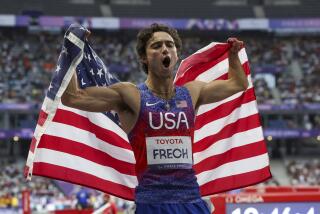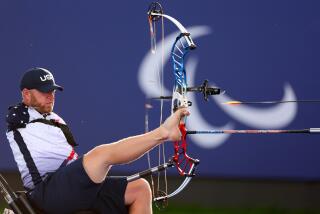MEETING THE CHALLENGE : Paralympics Participant Adam Polster Finds His Source of Strength in Swimming Competition
- Share via
SAN DIEGO — Adam Polster has felt ignored, left behind, even put down, but he has never felt physically handicapped, a label that has been attached to the 34-year-old with cerebral palsy and a hearing disorder.
Despite those afflictions, Polster can assert with confidence that he is not handicapped. And he credits athletic competition, specifically swimming, with boosting his self-respect.
“Saying ‘physically handicapped’ is like saying you can’t do something,” Polster said. “But (those labeled handicapped) can do things, it just takes (us) a little longer.”
Polster, a data technician for the Navy on North Island, is evidence of that. He is an international swimmer, having participated in the 1988 Seoul Paralympics last September, one week after the Olympics.
Polster, who was born with cerebral palsy, competed in three swimming events--the 400-meter freestyle, 200-meter freestyle and 100-meter freestyle. In each race, he set a personal-best time.
His time in the 100 meters came despite a slight flub. He heard a whistle right after the start and stopped dead in the water thinking a false start had occurred. That wasn’t the case.
After realizing his mistake, Polster restarted and completed the race in 1 minute 33 seconds (seventh place). He finished the 200 meters in 3:15 (ninth) and the 400 meters in 7:20 (seventh).
He said his goal at the Paralympics, and his goal in every competition he enters--such as Sunday’s third annual Physically Challenged Regional Swim Meet at the UC San Diego Natatorium from 9 a.m. to 4 p.m.--is simply to set personal bests.
’
“Sports is my way of saying, ‘I’m as good as so and so.’ I bowl and I work out with weights and I swim and people accept me for that,” Polster said. “It also helps me think of how I can better myself at other things. Sports is another way to test yourself and push yourself. It takes a real personal commitment.”
Like many other physically challenged athletes, Polster got a late start in sports. He began competing just four years ago.
Libby Anderson, the U.S. swim coach at the 1988 Paralympics, has an explanation why the physically handicapped are late in getting competitively involved: “The lives of disabled kids are filled with other things. They’ve got to concentrate on school and always work hard so they can get a job, become productive.”
But mostly the lives of disabled kids are filled with simply trying to keep up.
Polster knows. He remembers his journeys to grade school while growing up in Cleveland. He remembers trying to catch up with his able-bodied friends. He remembers falling further behind and running after them only to tumble to the ground. Frustrated, he would get up and start running again only to fall even harder.
He remembers feeling slow.
“I’d come home with bleeding knees a lot because I would fall down so much,” Polster said. “I used to always wonder, ‘What would my life be like if I wasn’t specially challenged?’ I would have been a hell of an athlete.
“I used to think about that a lot, but now since I’ve been swimming, I no longer think about what-ifs because swimming makes me realize who I am and what my limits are--if I have any. Swimming has taught me to take things one step at a time and what things I can change and what things I can’t.”
Anderson has been coaching Polster since he first entered swimming. She has seen him undergo a change.
“Since he’s become involved in swimming,” she said, “he’s become more confident, more outgoing. He’s gotten out of that comfort zone. He’s stepped out in front of people and given presentations. I don’t think he would have done that before.”
Both Polster and Anderson feel that sports for the specially challenged are ready to boom. It has only been in the last four to five years that they have received any attention at all.
The benefits of athletic competition for the specially challenged are too great to be ignored much longer, Anderson and Polster feel.
“Part of the experience is putting yourself out there on the line and pushing yourself,” Anderson said. “It helps you grow, that’s why sports is so good for kids, handicapped or not.”
Apparently, others have noticed the benefits of competition. Three years ago, the San Diego Physically Challenged Swim Meet attracted just 12 swimmers from San Diego. Come Sunday, 65 athletes from all over the Western United States will participate.
“One of the things we’re trying to do,” Anderson said, “is increase the awareness of the Parks and Recreation Department (as to the needs of the physically challenged), so by the time they’re Adam’s age, they’ll be world-class athletes.”
“No,” Polster argued, “retired world-class athletes.”
It would seem on the international level that sports for the specially challenged has attained a large degree of awareness.
The Paralympics in Seoul, for example, attracted specially challenged athletes from 64 nations and gave them an opportunity to run on the same track as Ben Johnson or swim in the same pool as Matt Biondi.
“I was very awed by the experience,” Polster said. “I kept telling Libby, ‘I can’t believe I’m here.’ Even now, I’m still speechless about it.”
And he is still slightly bitter about the way the media handled the event.
“The (American) swimmers alone set 37 world records and earned 75 medals,” Anderson said. “And the only coverage we got was a little box on the back page of USA Today. These kinds of things just don’t get out.”
Added Polster, “It was just so frustrating. When we got back, I’d have people come up to me and ask how we did. If certain people were able-bodied, they’d be household names in America. The funny thing is it’s partially the media’s fault and partially our fault because we need to get out there and publicize these things.”
Of course, swimming is only one challenge Polster has met in his life. Since his graduation from Monte Vista High School in 1974, he has earned a bachelor’s degree in public administration from San Diego State and gone on to his job on North Island.
He has become productive in society and competitive in sports.
“Now,” he said, “I know I can keep up with people.”
More to Read
Go beyond the scoreboard
Get the latest on L.A.'s teams in the daily Sports Report newsletter.
You may occasionally receive promotional content from the Los Angeles Times.






